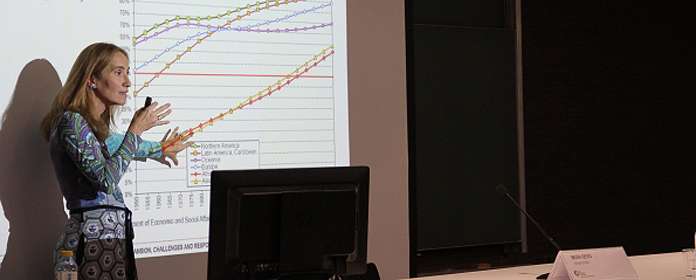"Every year 70 million people are added to informal settlement areas," says expert at NCID workshop
Belén Gesto, director of high school for Cooperation in Basic Habitability, participated in an international workshop organized by the NCID.

PHOTO: Courtesy
One of the major problems in developing countries development is the distribution of population in their towns and cities. The population is growing at an accelerated rate that locations are unable to assimilate. More than 50 experts discussed this issue at the 'NCID Workshop on Urban Issues in Developing Countries'. The activity was an initiative of the Navarra Center for International Development of the University of Navarra. Institute for Culture and Society of the University of Navarra.
Belén Gesto, director of high school for Cooperation in Basic Habitability, was one of the three speakers. In her talk she gave data of urbanization in countries at development. "More than 50% of the population lives in informal settlements. Every year 70 million people are added to these areas," she assured.
Also speaking at lecture wasPrimož Kovačič, director of Spatial Collective, a business that works with local actors in Nairobi to map informal areas and document previously unrecorded information. As an example, he mentioned that the settlement of Kibera, the largest settlement in Sub-Saharan Africa - with approximately one million inhabitants - was not included."
Among its achievements is solving a garbage problem by bringing together government representatives and students. The idea was promote communication and information to find a solution: to set up a garbage truck with specific schedules. "The development doesn't have to be complicated, sometimes it's very easy," he explained.
Artificial intelligence for citiesThe third speaker was Reinhard König, professor of Computational Architecture at Bauhaus-University Weimar. In his presentation he explained the uses of artificial intelligence to improve the design of the cities that need it. He explained that there are programs and tools that allow digital planning.
"We are trying to connect human intelligence and machines, since they are good at solving problems that you formulate, but not in intellectual capacity," so the expert proposes combining the two. He has carried out projects in several cities such as Cape Town. He is also working with the Ethiopian government to turn villages into small cities, to reduce pressure on the capital. The goal is to create some 800 cities in 5 years.




